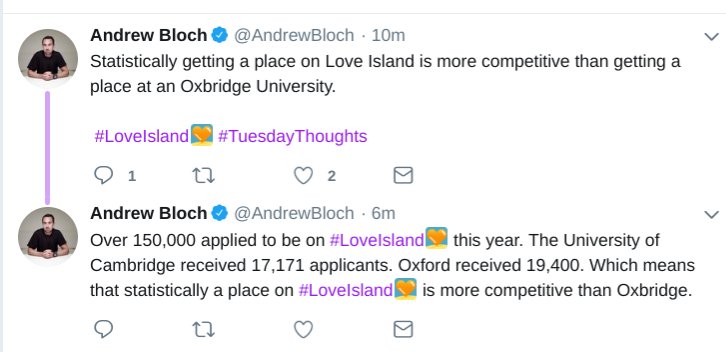This week in PR (8 June)

About the author
Richard Bailey Hon FCIPR is editor of PR Academy's PR Place Insights. He teaches and assesses undergraduate, postgraduate and professional students.

News in brief

- The Guardian reports on the Lush #spycops campaign. Was this a gaffe, or a valid example of corporate activism? Here’s Lush’s statement, but note the comments below which are mostly critical of the company’s stance.
- Dutch scholar Betteke van Ruler has been made an ICA Fellow. The International Communications Association (ICA) citation said: ‘Professor van Ruler has been a central figure in bringing cross-national and global perspectives to the study of public relations.’
- CIPR Excellence Awards 2018: here are the category winners.
- The shortlist has been announced for the PRCA / PR Week PR Internships Awards.
- How to achieve national news for an everyday consumer item? By floating the idea of a name change. It worked this week for Heinz Salad Cream.
- Ogilvy has rebranded (‘re-founding’ is the term it uses). Gone are the separate brands (Ogilvy & Mather, Ogilvy PR) and in come six core capabilities: brand strategy, advertising, customer engagement and commerce, PR and influence, digital transformation, and partnerships. Source: Holmes Report.
- Deaf practitioner Sara Hawthorn has initiated the new DisAbility PR Network (@DisabilityPR on Twitter) ‘to promote discussion, openness, change & build a disability friendly comms sector.’
Calendar
Our calendar of events now appears on a separate page
Thought leaders: Pick of the posts
These are the editor’s pick of posts about public relations this week (UK focused, but with a global outlook). Recommendations are welcome to editor@prplace.com or @pr_place
Business / profession
- Dominic Ridley-Moy: 3 priorities for CIPR’s new network for independent practitioners (5 June)
‘Because freelancers often work alone, they don’t tend to have the training, support or advice that you get working for an employer, or as part of a big agency. So, what would independents like to see?’ - Nick Barron: The Networked Age: To get brand purpose right, understand morality (5 June)
‘In The Networked Age, we have all become PR people. We share things online that make us look good — smart, virtuous, successful — and brands that allow us to project some aspect of ourselves that we admire are more likely to be shared, discussed, recommended and flaunted.’ - Sarah Hall: Placing purpose before profit (4 June)
‘To prosper over time, every company must not only deliver financial performance, but also benefit all their stakeholders, including shareholders, employees, customers and the communities in which they operate.’ - Padraig McKeon: Why we need a support system for PR practitioners of the future (3 June)
‘In [my] time as a senior advisor and an employer, I’ve seen many bright people come and go who knew the what, could do the how but didn’t progress because they didn’t get the why.’ - Roger Darashah: The Power of Adjacent Conversations (2 June)
‘There is a huge opportunity for brands to engage ‘the rest of the world’ and tell their story; provided they make themselves relevant.’ - Mark Borkowski: PR needs a trip to Love Island (1 June)
‘Done well, storytelling knows the balance to strike between emotion and fact, between humour and seriousness, alarm and insight.’
Careers and skills
- Amanda Coleman: Back to school (7 June)
‘It is only when we invest in ourselves that we can see PR becoming a recognised profession. One that is learning and constantly developing because those with it are learning and constantly developing.’ - Chris Taylor: Ears, eyes, mouth. Please use them! (6 June)
‘Ears. Eyes. Mouth. Starting by asking questions and listening is really important. I’ve not yet met anybody who likes being involved in a conversation where the other person just doesn’t listen to them.’ - Marcel Klebba: 12 lessons from my first 12 months in PR (5 June)
‘Finding a job you like will help you get out of the bed in the morning. And isn’t it cool to be paid for reading newspapers?’ - Stephen Welch: How to present in a team (5 June)
‘I was once the potential client at a sales pitch by a consulting firm: they had clearly rehearsed and knew their stuff. But while speaker A was talking, speaker B decided that was a good time to look at his phone and check emails.’ - Jo Martin: Should I even be here? (1 June)
‘Imposter Syndrome and perfectionism go hand in hand and leads to two usual responses.’ - Ronke Lawal: How to Become a Confident Public Speaker (1 June)
‘One of the most powerful things that you can do as a public speaker is to be of value to the audience. This means leaving them with something that they did not have before hearing you speak, teaching them something and leaving them with a message that lingers.’
Campaigns and creativity
- Alan VanderMolen: Technology vs Creativity: Where do Brands and Humanity fit in? (7 June)
‘There are three such ‘integral parts’ (or principal actors) in marketing today: Technology, Brands and Humanity. All three will be well represented at the Cannes Lions.’ - Andy Green: Who is your hero? Mine is the ventriloquist doll who landed on ‘D Day’ (6 June)
‘Fantasy Mentors are a brilliant 24 7 creativity tool. Whenever you are faced with a challenge simply pose the question to your role model: “How would Ted and Bertie tackle the problem of…?”’ - Pretty Green: FIFA World Cup Marketing: The Rules of Engagement for Brands (4 June)
‘Fan culture is far deeper and more complex than standard ‘consumer culture’ and, as such, has to be approached carefully.’ - Alex Malouf: Lessons from Cannes (and other awards) on what makes for great PR campaigns (2 June)
‘These four steps will help create powerful campaigns that should be worthy of putting into any top-tier awards competition.’
Crisis and reputation
- Ben Capper: Provocation, responsibility and relevance: the problem with Lush and #spycops (7 June)
‘While all the stuff about Lush’s history of supporting activism is absolutely true; there is an inherently big leap between campaigning about unethical animal welfare practice (which can relate quite easily and distinctly to the overall brand proposition) and police surveillance malpractice which takes a lot of back-reading to make any kind of obvious link).’ - Maja Pawinska Sims: Analysis: Fledgling Fintechs Confront Corporate PR Challenge (7 June)
‘Around 90% of the heads of comms I meet in this space are barely out of university, have never written a communications plan that isn’t about selling a product, managed a real crisis or made a bad story disappear.’ - Simon Carr: The disaster that never happened and how we dealt with it (6 June)
‘Even with the communally agreed exercise hashtag, our own hashtags #MockApoc and #JustAnExercise and a Bitly link to our original story it could easily have been misinterpreted as real by someone just flicking through their tweets.’ - Gary Taylor: The Millwall Defence (3 June)
‘Here’s a thought. If you don’t care about your customers, your reputation or your communications… what else don’t you care about?’
Gender and diversity
- Advita Patel: Be proud of who you are… (3 June)
‘We faced racism every single day for 12 years. We had fireworks through the letterbox, the house set on fire, racist graffiti on the windows, chants telling us to go home and cars vandalised.’
Internal communication
- Saskia Jones: Listen up: 10 ways to listen better to employees (6 June)
‘Below are 10 simple ways you can integrate listening into your ways of working. Many of them you’ll be doing already, some might be new. Put them all together and you’ll have your very own programme for listening to employees.’ - Mike Klein: Breaking The Rule Of Engagement: New Opportunities For Internal Communication (4 June)
‘During the last fifteen years the strategic, transformational potential of internal communication has been suppressed in the push for employee engagement.’ - Helen Deverell: Eight top tips to network with confidence (2 June)
‘It’s much easier to approach people if you’ve already had a conversation on Twitter or LinkedIn. Follow #TheBigYak on Twitter and join in the chat.’ - Emma Bridger: Should Employee Experience Replace Employee Engagement? (1 June)
‘Airbnb no longer have an HR department, instead choosing to focus on employee experience, with a team headed up by a Chief Employee Experience Officer.’ - Gloria Lombardi: New study shows 70 per cent of us skip the office to work elsewhere (1 June)
‘The world’s most successful businesses – including varied companies such as Etihad Airways, Diesel, GSK, Mastercard, Microsoft, Oracle and Uber – are already adopting a flexible workspace approach.’ - Martin Flegg: Some lessons from Higher Education (1 June)
‘There is a lot of governance and regulation in HE and the complex governance and decision making structures in a university reflect this.’
Media and digital
- Paul Blanchard: What is Paul Dacre’s legacy? It’ll take us 20 years to know (7 June)
‘We won’t know what Dacre’s legacy is for some time. It could be decades before we see what a United Kingdom without his influence looks like. He has been a fixture of national life for more than three decades.’ - Iliyana Stareva: Your Inbound PR Methodology & Tool Stack (5 June)
‘There are two ingredients that you need if you want to make Inbound PR work: a different mindset (a methodology) and a tool stack (technology).’ - Leah Domenet: Mary Meeker report 2018: Is social media even a part of the internet? (1 June)
‘49% of the world’s population are expected to be internet users in 2018, doubling in the last 8 years.’ - Julia Alexander: YouTube’s top creators are burning out and breaking down en masse (1 June)
‘YouTubers make almost all of their money from AdSense on YouTube. This creates a pressure to upload a video every single day; to see consistent reach and maintain their positions as top creators among a sea of growing competition, creators have to effectively game the system.’